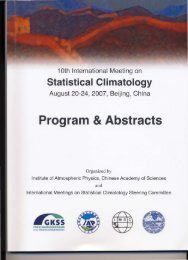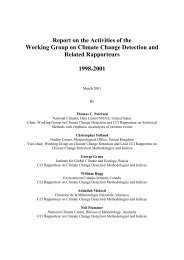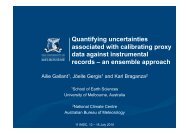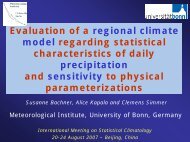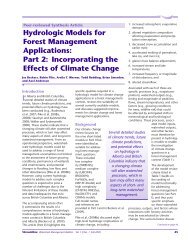The tenth IMSC, Beijing, China, 2007 - International Meetings on ...
The tenth IMSC, Beijing, China, 2007 - International Meetings on ...
The tenth IMSC, Beijing, China, 2007 - International Meetings on ...
Create successful ePaper yourself
Turn your PDF publications into a flip-book with our unique Google optimized e-Paper software.
We present applicati<strong>on</strong>s of several techniques intensively studied recently in the<br />
machine learning community to exploratory analysis of global climate data. <str<strong>on</strong>g>The</str<strong>on</strong>g> c<strong>on</strong>sidered<br />
techniques are related to rotating principal comp<strong>on</strong>ents using various statistical criteria. <str<strong>on</strong>g>The</str<strong>on</strong>g><br />
proposed algorithms use modeling assumpti<strong>on</strong>s plausible for the global climate system and<br />
they are closely related to the method called independent comp<strong>on</strong>ent analysis (ICA). <str<strong>on</strong>g>The</str<strong>on</strong>g><br />
proposed exploratory algorithms follow a comm<strong>on</strong> framework, which allows for finding<br />
underlying signals with properties of interest. <str<strong>on</strong>g>The</str<strong>on</strong>g> algorithms are iterative, alternating between<br />
estimating the important structure of extracted signals and using this structure to find new<br />
signal estimates.<br />
<str<strong>on</strong>g>The</str<strong>on</strong>g> proposed algorithms are applied to analysis of the daily global data from the<br />
NCEP/NCAR reanalysis project. <str<strong>on</strong>g>The</str<strong>on</strong>g> first example presents how using <strong>on</strong>ly the assumpti<strong>on</strong> of<br />
prominent interannual variability allows for finding the comp<strong>on</strong>ent capturing El Nino-Southern<br />
Oscillati<strong>on</strong> (ENSO): <str<strong>on</strong>g>The</str<strong>on</strong>g> time course of the most prominent comp<strong>on</strong>ent is a good ENSO index<br />
and the corresp<strong>on</strong>ding spatial patterns have many features traditi<strong>on</strong>ally associated with ENSO.<br />
Interestingly, the sec<strong>on</strong>d comp<strong>on</strong>ent extracted from the dataset combining the three variables<br />
somewhat resembles the derivative of the ENSO index. It is also possible to capture how the<br />
effect of ENSO changes depending <strong>on</strong> the time of the year using a slightly modified technique.<br />
Several other algorithms with applicati<strong>on</strong>s to the same climate dataset are presented. One<br />
technique finds a meaningful representati<strong>on</strong> of the slow climate variability as combinati<strong>on</strong> of<br />
trends, interannual quasi-oscillati<strong>on</strong>s (including ENSO), the annual cycle and slow changes in<br />
seas<strong>on</strong>al variati<strong>on</strong>s. This can be achieved by a similar technique which emphasizes slow<br />
behavior of time signals prominent <strong>on</strong> distinct timescales. Another approach is to analyze fast<br />
weather variati<strong>on</strong>s and find comp<strong>on</strong>ents in which such variability has significant behavior in a<br />
slow timescale. For example, it is possible to find fast varying comp<strong>on</strong>ents whose intensity of<br />
variati<strong>on</strong>s has been slowly increasing over the last decades.<br />
<str<strong>on</strong>g>The</str<strong>on</strong>g>re are lots of possible directi<strong>on</strong>s in which this research can be extended. For example,<br />
<strong>on</strong>e can study slow climate changes, n<strong>on</strong>linear effects such as interacti<strong>on</strong>s between<br />
phenomena (similar to ENSO-annual cycle interacti<strong>on</strong>s), spatially evolving phenomena,<br />
climatic effects <strong>on</strong> ecology, ec<strong>on</strong>omy etc. It might also be possible to learn the dynamics of<br />
some climate phenomena for making predicti<strong>on</strong> of their evoluti<strong>on</strong>. We developed a relevant<br />
algorithm which allows for finding groups of comp<strong>on</strong>ents with shared dynamics and predictable<br />
time course.<br />
<str<strong>on</strong>g>The</str<strong>on</strong>g> same algorithmic framework could be used for implementing new tools for<br />
discovering significant regularities in the climate. <str<strong>on</strong>g>The</str<strong>on</strong>g> new directi<strong>on</strong>s can be motivated by the<br />
type of features which might emerge during exploratory data analysis or can be based <strong>on</strong><br />
expert knowledge.<br />
31



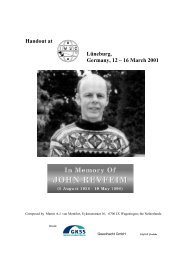
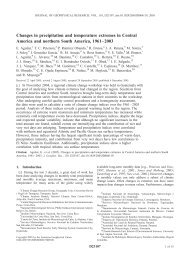
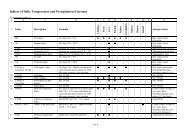
![final_program_abstracts[1]](https://img.yumpu.com/19102520/1/174x260/final-program-abstracts1.jpg?quality=85)
